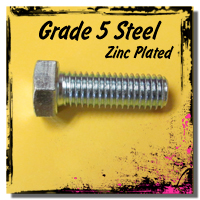Some Prevailing Myths about Grade 5 Bolts
Grade 5 bolts are usually manufactured from suppressed and tampered medium carbon steel. They are usually used when greater tensile strength is required during a process. It is processed through yield-to-tensile ratio, which is the lowest among all the heat-treated steels.
These bolts are available in both domestic and commercial categories, featuring coarse and fine threads (class 2A) along-with clear zinc finish. Usually ASTM A-354 and SAE J-429 Grade 5 bolts are available in the market. These are available in 1/4″ to 1-1/2″ diameters and 14″ of length.
If ever you like to compare this grade with any other grade say Grade 8 and Google on this comparison, you would be bombarded with a long thread. You would be amazed to find some forums and discussion rooms, where people have referred grade 5 as superior to grade 8, which is absolutely illogical.
You can easily come across various old wives’ tales even at some renowned publishing sites. Such myths act as a catalyst to enumerate such kind of wrong information.
Here’s a snippet from Sept’ 2011 issue:
In actual fact, Grade 5 bolts are often preferred over Grade 8 . A Grade 8 bolt has a very high tensile strength, but can be brittle. In applications such as suspensions, a very high number of load/unload cycles can produce work hardening, which produces an immediate, or catastrophic failure. Its often much safer to use a Grade 5 bolt which will bend, thus providing a warning, rather than a Grade 8 bolt breaking without warning. As long as the Grade 5 bolt has been sized large enough to take the expected load, we dont want to trade toughness (resistance to stress cycles) for the ultimate tensile strength of the Grade 8 fastener.
It’s true that grade 5 is an ideal fastener suitable for various applications, but to state that a grade 5 bolt is preferred over grade 8 bolt for mounting suspension components can be quite dangerous, as a beginner can believe such information and can try for such applications.

In this snippet, while the writer has left behind an admonition stating that grade 5 bolt will warn us before breaking, such statement has raised a great debate urging the experts to clear such myth prevailing with grade 5 bolts.
If we logically think over this comparison, we will realize that it doesn’t make any sense how a softer and malleable bolt can be superior than a brittle grade 8 bolt. In a layman’s point of view, one can understand that when the grade level increases, the features and durability also increases.
And if we think in the line of toughness then how come a bolt of lower grade can be tougher than a bolt of higher grade? Below is a chart stating the specifications of these bolts. Please have a look to understand the difference.
If we go through the mechanical properties, it’s clearly evident that in all aspects, Grade 8 bolts are superior than Grade 5 bolts.
To have a deep knowledge on this, you can visit websites like SAE and BoltScience, where you can get tested information. Even fastener suppliers like Mutual Screw and Supply render specification charts with their every displayed products.
However, there has always been an undying debate going on this when it comes to choosing either grade 5 or grade 8. While some people go by book knowledge, others prefer to learn from their experience.
In one of forums, somebody defines brittle as very strong, which does not allow strain before failure, and defines ductile as not so strong, but enables significant elastic deformation.
Grade 8 bolts fail because of strength, whilst grade 5 bolts fail because of toughness.
Leave a Reply